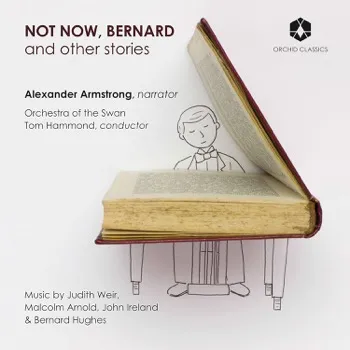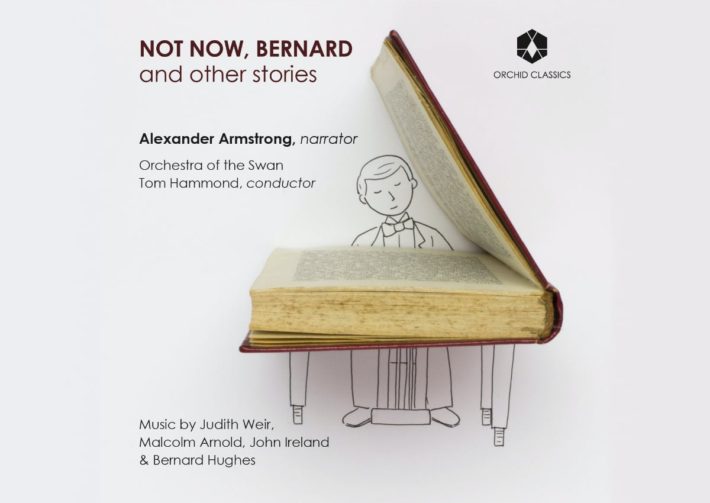When anyone is asked to think back to their first encounters with classical music, most of us remember school trips to hear a local orchestra or being introduced to “Peter and The Wolf” or “Carnival of The Animals” in school; some may be familiar with Poulenc’s comparatively less well-known “L’Histoire de Babar, le petit éléphant”. The story of “Peter and The Wolf” has become a timeless classic with many celebrity narrators ranging from David Bowie to Dame Edna Everage. Its undoubted success lies not just in the captivating story, but also in the creative and imaginative musical ideas and orchestration which make it immediately attractive. As with Saint–Säens’ “Carnival of the Animals”, its success lies in its straightforward yet evocative instrumentation, making it accessible and engaging as much to adults as children.

Orchid Classic’s new release — “Not Now Bernard and other stories” programmes six short works for children. Three of the works by composer Bernard Hughes — “Not Now Bernard”, “Isabel’s Noisy Tummy” and “The Knight Who Took All Day”, are interspersed with works by three other British composers — John Ireland, Malcolm Arnold and Judith Weir. Hughes’ works use the same model as Prokofiev’s “Peter and The Wolf”, but unlike that piece, the orchestra is a small instrumental ensemble, similar to that used by Saint–Säens. Each of Hughes’ works are shorter, lasting between 10—15 minutes. Alexander Armstrong is the narrator, who’s warm voice unites the album.
The first story, “Not Now Bernard”, written by David McKee, has a warming appeal. Hughes’ musical language is modern, but tonal — similar to that of Howard Blake’s used in the 1984 Christmas classic animation “The Snowman”. The opening march-like sequence gives ways to something more melodic as Alexander Armstrong begins his narration. This comical tale includes musical highlights that will entertain any adult. Those familiar with the themes of a range of popular British TV shows will find amusement in the musical content.
Arnold’s “Toy Symphony” is an appealing work. The first movement is lighthearted, but with a musical language not as instantly accessible as Hughes’. The darker, slower Allegretto has a sinister feel, fully captured by the chamber forces of the Orchestra of The Swan. The final movement contains all the sense of fun typical of this composer, as featured in his sets of dances.
“Isabel’s Noisy Tummy” — based on a text again by McKee, opens with the same march sequence as “Not Now Bernard” but evolves into something completely different. Again the music is approachable; the story has echoes of Roald Dahl’s, most obviously “George’s Marvellous Medicine”, making it completely engaging with moments of comedy that any child, parent or teacher would be familiar with.

Composer Bernard Hughes (Image ©️ Sarah-Jane Field)
The early-twentieth century English composer John Ireland produced a setting of Edgar Alan Poe’s poem “Annabel Lea” for piano and speaker. Hughes has carefully expanded the piano original into a quintet. The lilting music contains the hallmarks of Ireland’s style, but the inspired arrangement has the essence of Hughes’ orchestration, making it fit the album perfectly.
Hughes’ last piece is “The Knight Who Took All Day”, based on a story by James Mayhew. The music here is the most programmatic, revealing Hughes’ talents as a composer of evocative music which can be appealing for children. It could act as the perfect stimulus for creating a piece of art or dance as the sense of movement is strong. The final work — in its premiere recording, is Judith Weir’s “Thread!”. This is the most harmonically challenging work on the album. Based on the Bayeux Tapestry, Armstrong’s narration makes it feel connected to the other works, but it misses the imaginative storytelling and humour of Hughes’ works.
The playing of the Orchestra of The Swan conducted by Tom Hammond is excellent throughout. The recording quality is exceptionally vivid, allowing every instrument to be heard clearly, encouraging any teacher or parent to initiate discussions about sounds and instruments. Armstrong is a very characterful narrator, as he is on “Peter and The Wolf”, bringing a sense of drama and charm throughout, his received pronunciation ensures clarity in every word. The recording sounds spacious but not overly reverberant, giving a natural sense of live music-making.
This is a welcome release for anyone looking for a gift or a way of introducing children to classical music discretely. Hughes’ works don’t tire easily from repeated listening. This album would sit comfortably alongside a library containing Britten’s “Young Person’s Guide to The Orchestra”, Ravel’s “Mother Goose” or Grieg’s “Peer Gynt”.
“Not Now, Bernard and Other Stories”
Bernard Hughes – “Not Now, Bernard”, “Isabel’s Noisy Tummy,” “The Knight Who Took All Day”
Malcolm Arnold – Toy Symphony, Op.62
John Ireland – “Annabel Lee”
Judith Weir – “Thread!”
Alexander Armstrong – Narrator
Orchestra of the Swan
Tom Hammond – Conductor
Orchid Classics, CD ORC100115




















